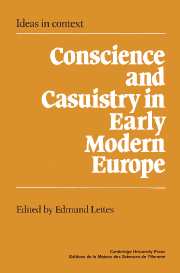Book contents
- Frontmatter
- Contents
- Notes on contributors
- Introduction
- 1 Governing conduct
- 2 Laxity and liberty in seventeenth-century English political thought
- 3 Casuistry and character
- 4 Prescription and reality
- 5 The ‘new art of lying’: equivocation, mental reservation, and casuistry
- 6 Kant and casuistry
- 7 Moral arithmetic: Seven Sins into Ten Commandments
- 8 Optics and sceptics: the philosophical foundations of Hobbes's political thought
- Index
8 - Optics and sceptics: the philosophical foundations of Hobbes's political thought
Published online by Cambridge University Press: 13 October 2009
- Frontmatter
- Contents
- Notes on contributors
- Introduction
- 1 Governing conduct
- 2 Laxity and liberty in seventeenth-century English political thought
- 3 Casuistry and character
- 4 Prescription and reality
- 5 The ‘new art of lying’: equivocation, mental reservation, and casuistry
- 6 Kant and casuistry
- 7 Moral arithmetic: Seven Sins into Ten Commandments
- 8 Optics and sceptics: the philosophical foundations of Hobbes's political thought
- Index
Summary
When moral philosophers at the end of the seventeenth century began for the first time to write the history of their discipline, they accepted as self-evident a particular account of the origins of a modern ‘science of morality’. According to Jean Barbeyrac, the most systematic and interesting of these writers, all moral philosophy up to the time of Hugo Grotius had been almost worthless. Aristotle, the most influential classical writer on ethics, had contaminated the subject by his unsystematic and local opinions about such things as the virtues and the possibility of natural slavery; Cicero's De officiis was the best ancient ethical treatise, but even that was flawed in many ways. The Church Fathers were equally unsatisfactory, while the medieval scholastics produced a confused mix of Aristotelian ideas. But once Hugo Grotius ‘broke the ice’, a true science of morality became possible, and his insights were exploited and systematized by a number of followers: John Selden, Thomas Hobbes, Richard Cumberland, and finally Samuel Pufendorf and John Locke. By a ‘science’ of morality, these historians of course understood an episteme – a systematic body of knowledge deduced from a set of necessary principles.
This is on the surface a strange history, and it has usually been disregarded by modern (Le. post-Kantian) historians of the subject (I myself in my Natural Rights Theories thought it clearly mistaken in some fundamental matters). It is not, in fact, as odd as it might seem.
- Type
- Chapter
- Information
- Conscience and Casuistry in Early Modern Europe , pp. 235 - 264Publisher: Cambridge University PressPrint publication year: 1988
- 26
- Cited by

